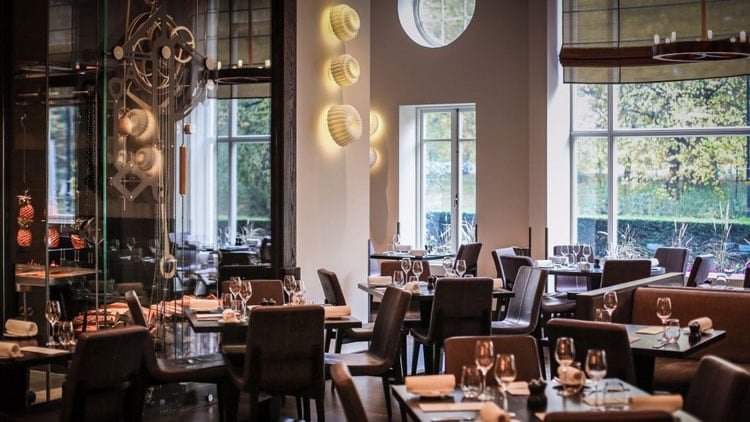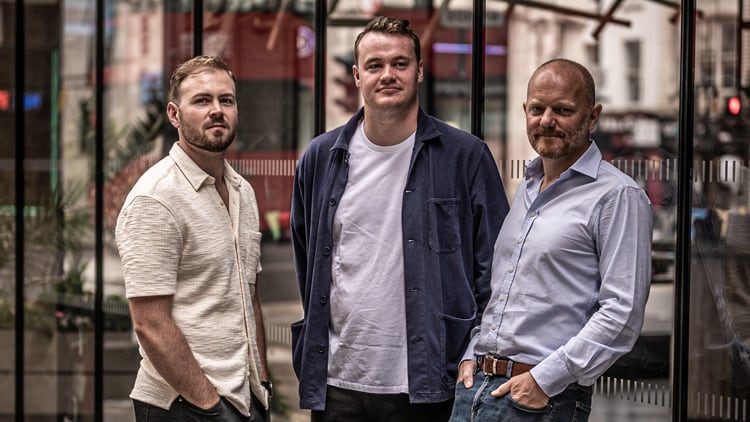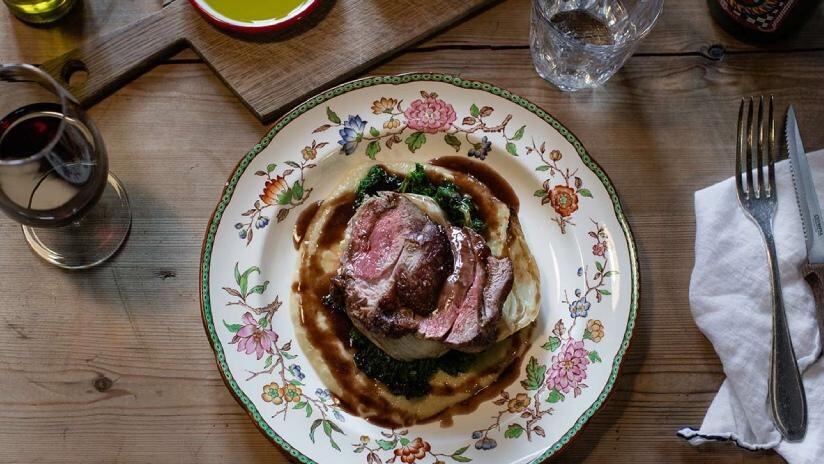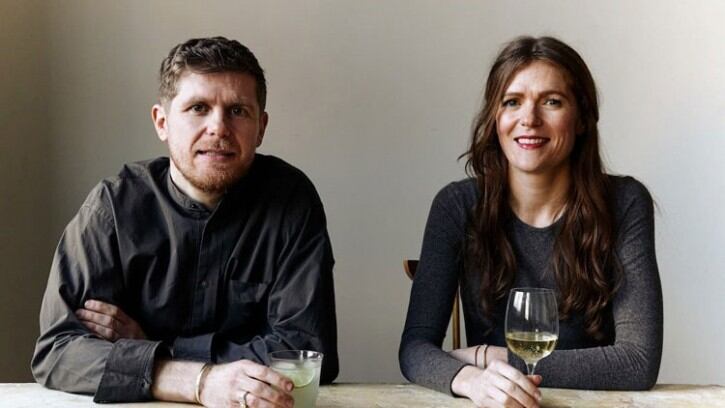Menus that make use of overlooked ingredients
In 2017, Skye Gyngell’s Spring restaurant in London launched a relatively inexpensive early evening menu that championed overlooked and waste produce including misshapen vegetable and the bread from the day before. Doing the right thing by suppliers and the planet while driving business during quieter periods was a savvy and forward-thinking move (seven or so years later, the menu remains).
The idea has now been picked up by a number of other restaurants including sustainable stalwart Silo - which runs special dinners that focus on invasive species including Japanese knotweed and grey squirrel - and, somewhat unexpectedly, Dinner by Heston Blumenthal. The latter, which holds two Michelin stars and serves dishes that have their roots in British recipes of yesteryear, launched the £59 Luncheon Menu as a counterpoint to its far more expensive tasting menu and a la carte menu last year.
Featuring dishes including smoked salmon belly with dill, yoghurt and sourdough; ragoo of pig’s ears; Batalia pie with beef sweetbreads, heart and celeriac; and Lamington cake with white chocolate mousse, coconut and rhubarb, the menu is designed to show that sustainability is not a modern day innovation.

Content provided by Lanchester Wines
A pioneer of sustainability, Lanchester Wines has become the first UK wine business to offer a super lightweight 300g wine bottle to its bulk wine customers. Shipping wine in bulk saves around 38% CO2 compared to shipping in bottle. The new 300g wine bottle removes 3.2 tonnes of bottle weight per 24,000l of wine (300g bottle vs UK standard 400g bottle) from the finished goods, further reducing the carbon footprint of a venue’s wine list. Partnering with renowned glass manufacturer Verallia, we’ve pioneered the use of this innovative bottle setting a new standard for sustainability in the wine industry. The Verallia Bordelaise Air 300g offers 25% CO2 reduction compared to UK Standard 400g bottle. Crafted with approximately 30% recycled glass and designed specifically for the wine sector, the Bordelaise Air 300g combines eco-friendliness with the timeless elegance of the classic Bordeaux wine bottle. Glass is 100% recyclable and the UK glass sector recycles around 74.2%, one of the highest rates of any packaging materials (according to britglass.org.uk). Because being carbon neutral is just the beginning.
Regenerative farming
The term regenerative farming was coined in the 1980s but people have been putting the soil first since long before then. Key practices associated with the movement include topsoil regeneration, a drive to increase biodiversity and generally strengthening the health and vitality of a farm’s soil. While the term regenerative farming is most associated with small scale agriculture - a number of farm-to-table restaurants are champions of farming regeneratively including Wilsons in Bristol, Crocadon in Cornwall, The Smallholding in Kent and Simon Rogan’s Our Farm in The Lakes - the practice is now being adopted by larger scale farms.
Mass production opens up ingredients that have been farmed regeneratively to larger businesses. Earlier this year, 66-strong casual dining chain ASK Italian became the first major Italian restaurant group to make its pizza with regenerative flour. The group says its partnership with Wildfarmed will see a 50% reduction in the carbon impact when compared to its previous dough. “The work that Wildfarmed does to improve farming and biodiversity is hugely important when looking at making a positive impact on the way we farm our food,” says ASK Italian marketing director Corinne Prior. “Dough is amongst the top five ingredients that directly contribute to ASK’s food emissions so our partnership with Wildfarmed is a significant step towards our net zero goal.”
Urban gardening
While growing a few ingredients on site is nothing new, chefs are now upping the ante creating by more sophisticated setups that provide a more significant proportion of the food for their menus. Technology - including aeroponics, hydroponics, and vertical farming systems - have helped immensely, allowing kitchens to grow a wider variety of ingredients quickly and efficiently.
Recently launched Canary Wharf restaurant Roe is making a big feature out of a sophisticated aeroponic wall that grows lots of different types of produce including peas, a variety of different peppers, strawberries, and herbs (lemon verbena, butterfly sorrel) that will be used across the menu. The wall represents a significant investment for the business as it looks to further bolster its sustainable credentials.
It’s not the first time that the trio behind Roe - chefs Will Murray and Jack Croft and restaurateur James Robson - have looked to innovate in this regard - their debut restaurant Fallow grows its own mushrooms in a small room built on top of a fridge in a basement kitchen.
Also in London, Spitalfields gastropub the Culpeper features a rooftop kitchen garden in which guests eat surrounded by all manner of produce including herbs and vegetables. This year, owners’ Nico Tréguer and Gareth Roberts upped the ante with 3,500 sq ft plot at South East London’s Deptford Little Farm that is now supplying the Culpeper and their three other London pubs.

Content provided by Biffa
What iff business challenges became dinner solutions? Policies such as Workplace Recycling in Wales and Simpler Recycling in England are driving change in how waste is collected and managed. Separating food waste in UK businesses is a welcome step, however the best outcome is to avoid the waste before it happens. Redistributing surplus stock is an effective way to prevent products that are still fit for human use and consumption from going to waste. As part of Biffa, Company Shop Group works with manufacturers and retailers to identify surplus that can be redistributed, before it becomes waste, ensuring it goes to people first. “Through redistribution, we can support the industry in more ways to transform surplus and preventing waste, by using innovative capabilities such as our bottle wash facility, which prevented 3.2m bottles from going to waste in 2023.” Owen McLellan, group managing director at Company Shop Group.
Zero waste
Increasingly, a zero waste approach is not just the preserve of restaurants which put their sustainable practices front and centre. Top restaurants including Sat Bains’s two Michelin-starred restaurant in Nottingham are now getting in on the act with a number of projects including a closed-loop composter to turn food waste into fertiliser for its urban kitchen garden (see above).
At Bristol’s Wilson’s - which is listed on Restaurant’s list of the top 100 places to eat in the UK - very little goes in the bin. For example the stalks from veg including cauliflower and broccoli is rendered delicious by being made into kimchi, which is in turn used to lend acidity to sauces.
In London, Chantelle Nicholson has created a refined Mayfair restaurant that makes intelligent use of things that often end up in the trash. Sustainable produce is used at the height of the season from small-scale farmers with chefs taking a low-waste approach to cooking. This low waste ethos extends to the restaurant’s design, which resulted in a 40% decrease in emissions compared to a standard restaurant fit-out thanks to the use of recycled materials. Moreover, everything was designed so it can be taken apart, re-used, donated, or recycled at the end of its life.
One of the pioneers of zero waste restaurants, Silo is now doubling down with the launch of a fermentation factory that will produce commercial quantities of koji and beer grain miso. Founder Douglas McMaster says that the Silo team want to share the fruits of its labour by making their fresh koji accessible business-to-business, ‘facilitating other restaurants, bakeries, breweries, bars and home cooks with their journeys to reduce waste’. Headed up by Ryan Walker, ‘fermentation guru’ and frontrunner in Silo’s research and development, the project aims to upscale what has previously been an in-house venture, ‘transforming challenging ingredients into exceptional, high-value products’ that can be used in mainstream kitchens and bars.
Reappraising plant-based
Everybody knows that a greater emphasis on fruit and vegetables is good news for the planet. But meat, fish and dairy-free dining can be a tricky sell for more ambitious restaurants because - frankly - tags like plant-based and, worst of all, vegan put a lot of dinners off (especially when they are considering dropping comparatively large sums).
Siblings Kirk and Keeley Haworth (pictured at the top of the article) are looking to change this with their debut solo restaurant project. Opening in Shoreditch next month, Plates is not being marketed as a plant-based restaurant. “There will be no meat, fish or dairy in the kitchen but I don’t like putting labels on my food and I don’t like the political connotations of the word vegan,” Kirk explains. “I’m trying to create a restaurant that is as exciting, creative and delicious as anything else out there. My job is to make a carrot dish as sexy as a scallop dish. We want to deliver at such a high level that people won’t even think about the word vegan.”
The price point of the pair’s new restaurant has yet to be confirmed but it will be high-end with Kirk’s CV including The Square and Restaurant Sat Bains. With a mission to change perceptions of how fruits, vegetables and plants can be transformed, Plates is unquestionably a restaurant to watch closely.
Chefs that in general focus on meat and fish are also taking plant-based more seriously as a category. For example, Le Manoir aux Quat Saisons is celebrating its 40th year with a plant-based menu that sees some of chef patron Raymond Blanc’s best-known dishes reworked. As you’d hope at £245 for seven courses, a lot goes into it, with dishes including stuffed morel, white asparagus and Gewurztraminer; garden beetroot terrine and horseradish sorbet; and red fruit steeped in red wine, fresh mint, basil and rosé Champagne.
The Bull Inn takes home the Estrella Damm Sustainability Award
Located in South Hams, Devon, The Bull Inn is an organic, ethical gastropub and hotel that makes the most of being surrounded by some of the best organic food producers in the UK. After a year of ecologically-driven renovations it launched in late 2019 as a truly supplier led, organic restaurant.
The business is run by a ‘No Bull Rules’ ethos that covers dining, trading, and its workforce. Rules under the first include the serving of veg-first, seasonal, local food and mindful meat while its self-imposed rules for trading include choosing green energy suppliers, buying recycled and recyclable, Fair Trade, organic, sustainable or ecological wherever it can, and reducing and challenging the use of packaging. Its staff, meanwhile, benefit from a supportive working culture and pay significantly above the Real Living Wage.

The Sustainability Award is judged by the Sustainable Restaurant Association, which was particularly impressed with The Bull’s practises, such as avoiding pre-packaged snacks, cling film and bottled water; using ecological cleaning products and aprons made locally from recycled materials and plant-based dyes; and its collaboration with organisations, charities and local businesses to further their impact.
It was also recognised for its implementation of a heat recapture system in the kitchen, the use of solar energy panels for preheating hot water, and the monitoring of energy usage in real-time. The Bull purchases 100% renewable energy and processes food waste locally at Langage Farm’s anaerobic digestion facility to produce electricity, heat and fertilisers, resulting in the only carbon-neutral dairy in the country.
The Bull’s dedication to working sustainably with its food and suppliers was also commended. The kitchen buys and butchers whole animals to minimise waste. Its own organic farm, Baddaford, is dedicated to regenerative farming and wildlife restoration, with reservoirs conserving water and providing habitats, spinneys offering cattle feed and shade, and fruit orchards supporting biodiversity.

